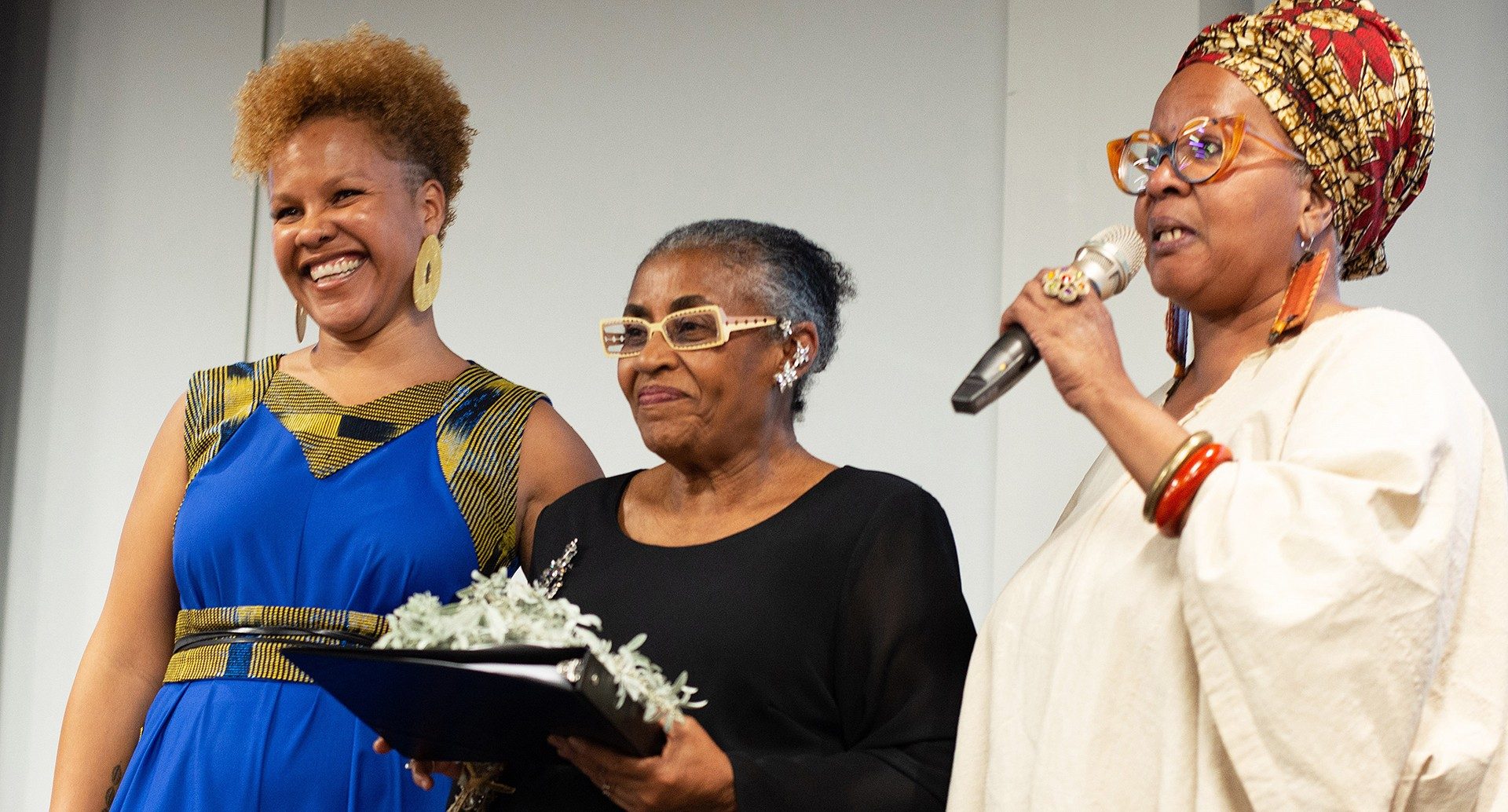Canada
Black Educator Esmeralda Thornhill Is Honored By Concordia’s Simone De Beauvoir Institute.

Black Educator Esmeralda Thornhill Is Honored By Concordia’s Simone De Beauvoir Institute:
The Simone de Beauvoir Institute at Concordia University awarded the third Simone de Beauvoir Prize to Black educator and human rights champion Esmeralda Thornhill. Thornhill has worked as a teacher, lawyer, law professor, and human rights and anti-racist education specialist.
Thornhill has several degrees, including an LLB in civil law from the Université du Québec à Montréal. She earned Quebec’s 1992 Lauréate de l’année for humanitarian and social activities. Concordia University awarded her an honorary degree in 1997.
Thornhill passionately discussed Canada’s history of Black women’s erasure and exclusion to an interested audience, including Montreal’s Black leaders. She stressed historical recovery and portrayed commemoration gatherings as an act of agency, recognizing Black women’s local and worldwide anti-racist efforts.
Thornhill called the Simone de Beauvoir Prize “a public acknowledgement and recognition by Concordia University.” in her keynote presentation. Her breakthrough course, “Black Women: The Missing Pages,” was inspired by Montreal’s English-speaking Black population.
Thornhill mentioned the course’s collaborative creation and the value of discourse. She discussed the institutional and administrative obstacles to organizing the course and how the Black Women’s Congress approached the Simone de Beauvoir Institute with the concept.
The groundbreaking “Black Women: The Missing Pages” challenged women’s studies. Thornhill said, “It raised the level of debate and improved the quality of discourse, thereby disrupting traditionally accepted epistemology and discourse about women and feminism in Canada.”
This coincided with Simone de Beauvoir Institute’s 45th anniversary. Since 1978, Canada’s oldest women’s studies program has promoted gender, sexuality, racism, and other oppressions through research, teaching, and critical thinking.
Institute principal Kimberley Manning praised Thornhill and her legacy. The institution highlights Black feminist study, scholarship, and action. The Dr. Thornhill Black Feminist Speaker Series was launched during the festivities to highlight Black feminist academics’ prior accomplishments.
According to Faculty of Arts and Science Dean Pascale Sicotte, Harambee, and the Simone de Beauvoir Institute are working to correct historical injustices and erasures in Concordia’s Black research and teaching. These joint activities are crucial to the university’s inclusion and diversity efforts.
Esmeralda Thornhill’s Career Breakthrough
Concordia University’s Simone de Beauvoir Institute honored Black educator and human rights advocate Esmeralda Thornhill for her exceptional career combating prejudice and promoting Black excellence. Thornhill has worked as a teacher, lawyer, law professor, and human rights and anti-racist education specialist. Her degrees include an LLB in civil law from the Université du Québec à Montréal, and she is a member of the Quebec and Nova Scotia bar organizations.
Thornhill received Concordia’s 1997 honorary degree and Quebec’s 1992 Lauréate de l’année for humanitarian and social action for her pioneering work. She intensely discussed Black women’s history of racism and discrimination in Canada in her keynote talk. The Simone de Beauvoir Institute honored Thornhill for her hard work in education and fighting to challenge structural racism.
Historical Recovery: Black Women’s Legacy
Esmeralda Thornhill’s speech addressed the erasure and marginalization of Black women in Canadian history and the significance of historical reclamation. Her innovative course, “Black Women: The Missing Pages,” revealed Black women’s secret contributions to society. The course disturbed women’s studies and created controversy about women and feminism in Canada.
Thornhill stressed the need to honor Black women’s history in North America. “Black Women: The Missing Pages” added to the racial conversation and highlighted Black women’s role in elevating their communities and society. Thornhill’s historical recovery is essential to ending institutional racism and promoting a more inclusive view of Canada’s history.
Read Also: Montreal Jewish School Faces Second Gunfire Attack: Mayor Condemns Hate Crimes
Continued Commitment: 45 Years Of Promoting Equality
As the Simone de Beauvoir Institute turned 45, the ceremonies pledged to fight bigotry and promote equality. The institute is Canada’s oldest women’s studies program, doing research, teaching, and critical thinking on gender, sexuality, racism, and other oppressions since 1978.
The institute’s head, Kimberley Manning, praised Thornhill’s legacy and the continued efforts to highlight Black feminist research, scholarship, and activism. The Dr. Thornhill Black Feminist Speaker Series promotes Black intellectual voices. These activities remind us that Concordia University must still confront historical injustices and erasures in Black research and teaching.
In conjunction with Harambec and the Simone de Beauvoir Institute, these activities commemorate Black intellectuals’ vital achievements and promote diversity and the fight against prejudice. The institute’s dedication to diversity reflects a social need to identify and correct past injustices and create a more equal future.
Thornhill’s Impact On Anti-racist Education Powers Future Generations
The landmark course “Black Women: The Missing Pages.” epitomizes Esmeralda Thornhill’s anti-racist education legacy. Thornhill discussed the institutional and administrative obstacles to course scheduling in her keynote talk. Despite these challenges, the course changed Canadian education and raised awareness of racism and feminism.
“Black Women: The Missing Pages” emphasized Black women’s history and changed women’s studies. When the Black Women’s Congress contacted the Simone de Beauvoir Institute with the concept, Thornhill stressed the significance of the discussion. The institute’s head, Dr. Maïr Verthuy, identified the need to “make women’s studies relevant to all women,” which resonated with Thornhill and established a course with enduring influence.
Thornhill’s course revealed an understudied history of Black women in Canada. “Missing Pages” highlighted North America’s little-known Black women’s organizations’ importance in improving families, communities, and society. Thornhill empowered Black women and improved knowledge of race and gender in Canada.












You must be logged in to post a comment Login